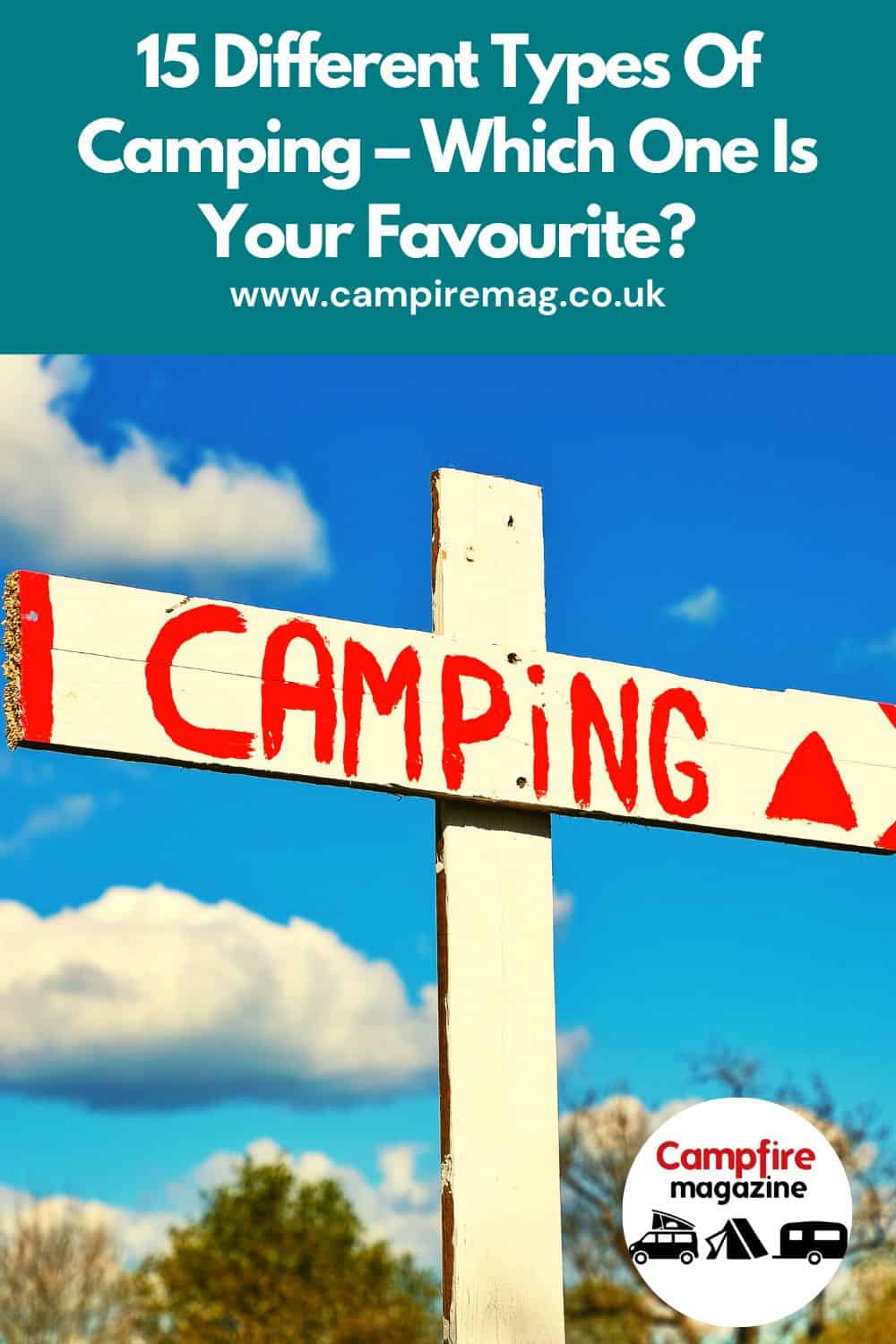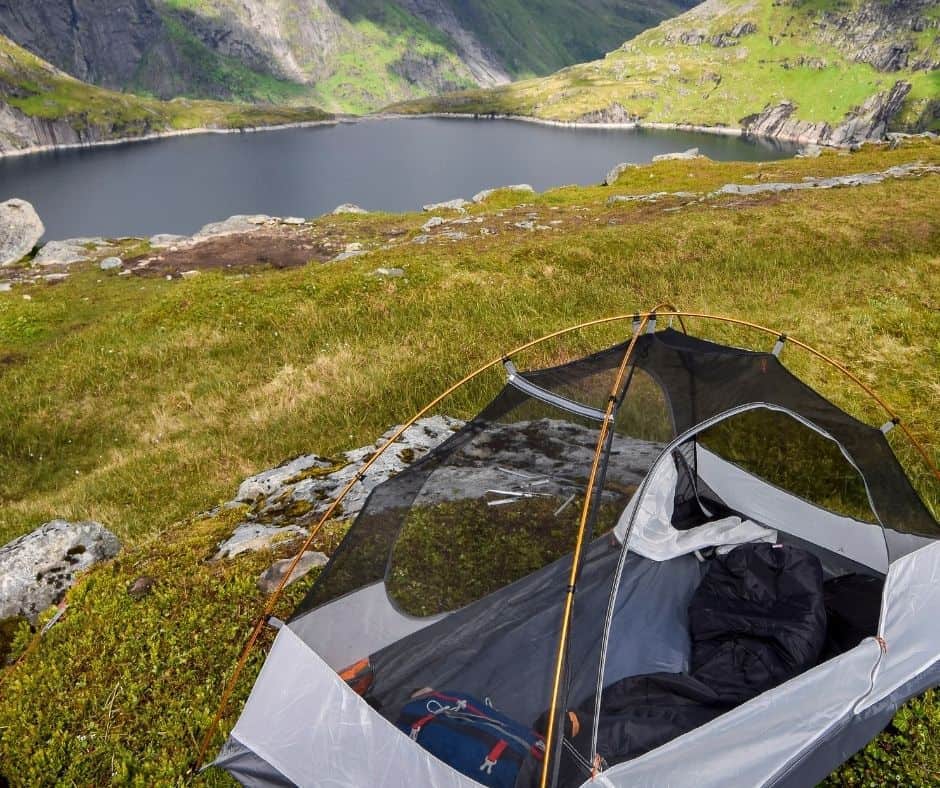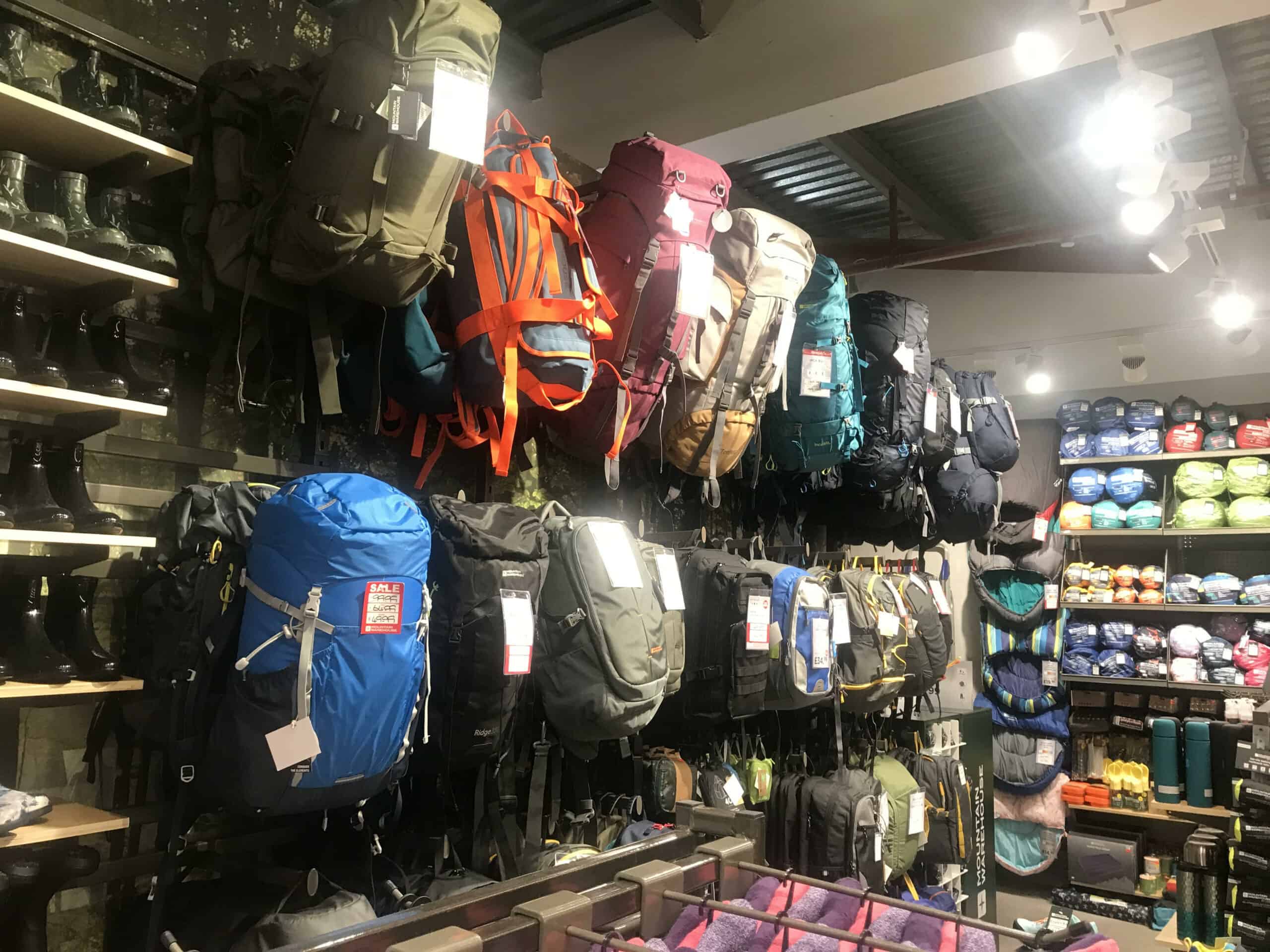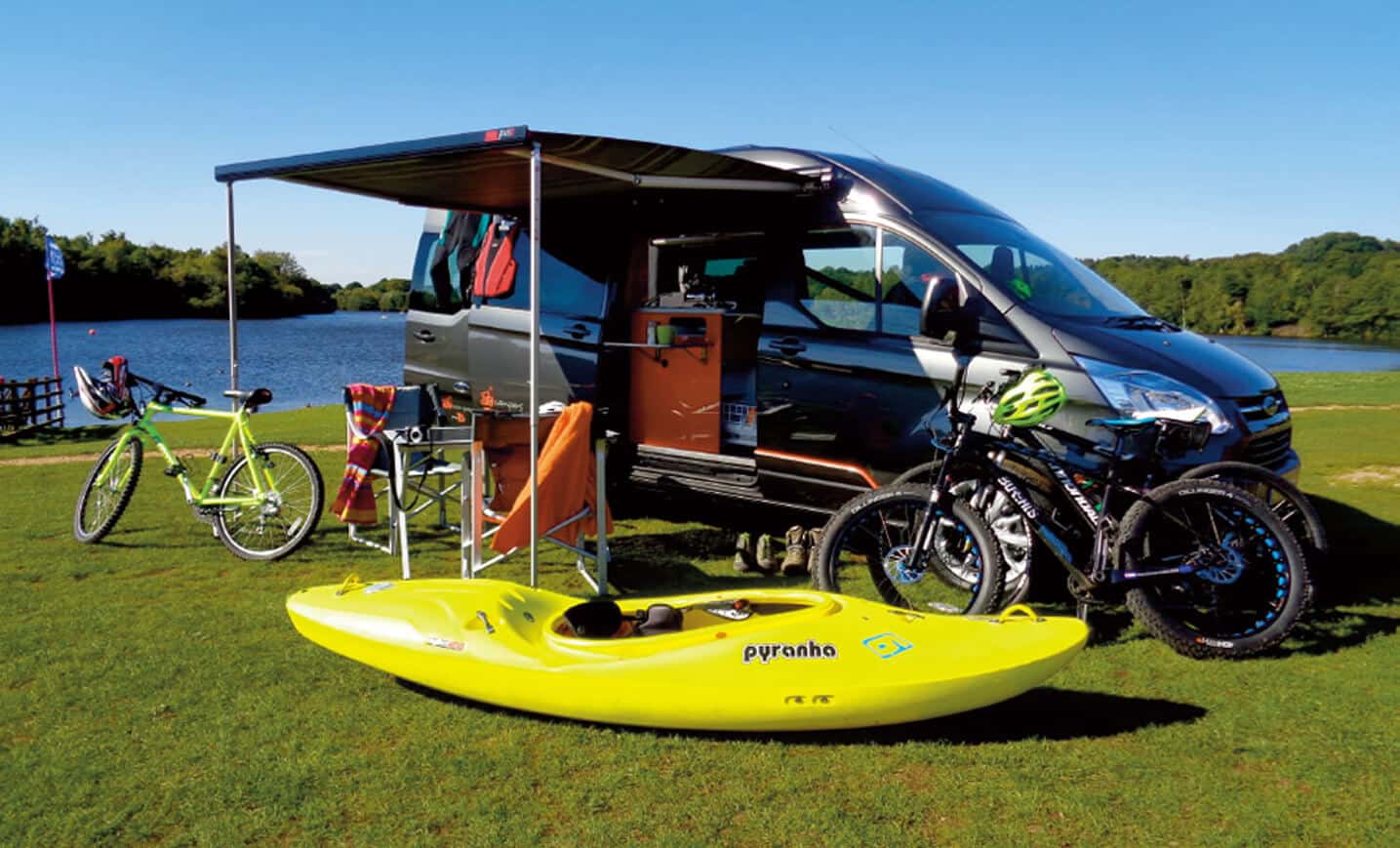When most people think of camping, they imagine the same activity; putting up a tent and sleeping in it. While this is the basic concept, there are actually lots of types of camping and there are some pretty significant differences between them.
If you’re new to camping or fancy switching up your outdoor adventures, then this guide is for you. We will be looking at the various ways of camping so you can discover your new favourite pastime!

15 Of The Most Exciting Ways To Camp
All of the methods of camping we are going to talk about are easily accessible to pretty much anyone reading this. However, it is worth pointing out that some of these types of camping are more suitable for advanced campers while others are better for beginners. Don’t try to push yourself too far too soon or this may spoil the experience for you.
Traditional Camping
Let’s start with the most obvious; traditional camping, in a tent. This is usually what people think of when they imagine camping and while it is simple, it’s also incredibly enjoyable. What’s great about this type of camping is that it suits almost anyone. It’s ideal for families but great for couples and singles too.
You have a wide variety of choices when it comes to where you will camp. For example, there are thousands of campsites set up around the country and even further afield. All you need to do is pack your tent and choose your destination; and if you’re not happy, it’s easy enough to pick up and move on.
Another great thing about traditional camping is that you can do it for just a couple of nights or weeks at a time. It all depends on the type of tent you have and the equipment you take with you but some people like a long adventure and turn their tent into a home from home.
Traditional camping is great for people who are new to camping as it allows an insight into the responsibilities involved but breaks you in gently. This is why a lot of parents choose it for their children as the whole family can get involved.
You can take part in a whole host of camping activities using this method. If you want to simply kick back and relax, you can build a campfire and watch the world go by. But if you’d prefer something a little more intense then it’s just as possible to pitch up near to local activities such as cycling, hiking, caving, canoeing and many more.

Winter Camping
Traditional camping usually takes place in the summer months when the weather is a little more favourable. But that doesn’t mean that you have to pack your tent away as soon as it starts to get a little colder. Quite the opposite.
Provided you have the right gear, winter camping can be a real experience but we would urge you to err on the side of caution and perhaps leave this until you have gotten used to traditional camping as the change in weather can be a bit of a shock.
You must ensure correct planning when taking part in winter camping as you’re going to need extra gear such as thermal sleeping bags, ways of heating your tent and equipment that can stand extreme conditions such as high winds etc.
But once you’ve got everything organised, this is a great way to see the world in a totally new light. The landscape during winter will be much different and the things you can take part in will change. Why not head to an Alpine campsite and take part in skiing and mountain climbing?
Backpacking
If you’re happy to strip things back a little and live a slightly more wild existence on your camping trip then backpacking might be for you. It’s an amazing way to explore the world and get back in touch with nature. What’s more, since you’re so independent, you have the freedom to explore more as you won’t need to stay on a campsite.
One of the most important parts of backpacking is being prepared for every eventuality. You are going to be moving through various places and the things you’ll need may vary from one place to the next. This is why packing the right gear is so important but as the name suggests, you’ll carry it all on your back so you need to be clever about what you take. Food supplies may dwindle so it’s worth getting yourself clued up on foraging.
What a lot of people don’t realise is that what you have on your feet can really affect a backpacking trip. You’re going to be walking some miles so you’ll want something comfortable, supportive and robust.

Ultra Light Backpacking
Are you ready to take your backpacking adventure to the next level? If so, then you might want to try ultra light backpacking. This gets rid of a lot of the weight you would carry in your pack by reducing it down to the bare essentials. It sounds scary but with proper planning and preparation it can actually be an invigorating experience.
There are some very dedicated ultralight backpackers out there who have almost set the precedent of what this activity should look like. For example, the weight of your backpack should not exceed 28lbs and any items you take with you should be multi-functional. For example, a metal bowl that can be used to cook food, eat it and then used to drink water from when you’re done.
If you’re totally new to camping, this can be a little extreme but the key thing to remember is that this type of camping is designed to get you back to basics and enjoying nature without any modern distractions.
Boondocking
While in the USA, this is often called boondocking, you may more commonly hear British people referring to it as dry camping. But whatever you call it, it’s the same thing. This form of camping is done in an RV and involves the campers parking in various ‘wild camping’ locations allowing them to camp without having to pay.
The obvious downside to this is that you won’t benefit from water or electrical hook ups like you would on a campsite. But if you’re willing to rough it a little more and have the right supplies then there’s no reason you can’t enjoy dry camping.
What’s really great about boondocking is that you have the ability to see the world in a way that you want to see it. Want to watch the sunrise in a national park? It’s totally possible. Want to get up close and personal with nature? You can do that too. Of course, there are limitations on where you can park and it’s always common decency to seek permission from the land owner if you want to avoid any confrontations.
Glamping
You’ve probably heard of glamping as a luxury version of camping. That’s exactly what it is. Many hardcore campers would argue that this isn’t actually a form of camping but you’re staying in a type of tent so we feel it falls under the vast category.
Glamping is an excellent choice for people who want to experience everything that camping has to offer without having to give up their creature comforts. If you look at some of the glamping pods out there, many resemble luxurious hotel rooms and have some stunning features.
This type of camping has become incredibly popular in recent years as it caters to a whole new audience. Once it took off, more and more glamping locations began popping up all over the country so you won’t be hard pushed to find one.
For people who have a fear of ‘real’ camping, glamping is a great way to explore the natural world without all the inconveniences. You won’t even have to worry about pitching your tent because everything will be done for you.
RV Camping
Who said that camping has to be done in a tent? There are many types of RV and while the term does refer to a specific vehicle, this could also include caravans, campervans and motorhomes. Some of the most high end RVs are kitted out with all of your home comforts and then some so they’re ideal if you don’t want to rough it.
What’s more, your transport and accommodation are all in one so you have the freedom to move around the country at your leisure. Do keep in mind that some of the larger RVs may find it difficult to access certain areas so it’s something to keep in mind.

Adventure Camping
Before we get into the nitty gritty of adventure camping, it is worth pointing out that this isn’t a style of camping for the faint hearted. This is usually reserved for those with a little more experience as it can be quite challenging. Adventure camping involves hiking through the wilderness and stopping overnight in a suitable camping spot.
The great thing about it is that you will really get to explore what the world has to offer by trekking through national parks and areas of natural beauty. You may find places that you never otherwise would have and this is one of the very best ways of getting back in touch with nature.
Much like backpacking, it does involve leaving some or your luxuries behind and you’ll largely have to carry what you can in your pack. That said, there are some companies that offer ‘luxury’ adventure camping which is a little more suitable for those who don’t want to completely strip it back.
Work Camping
Your daily commute doesn’t have to be a boring one. In modern times, we are finding more and more ways to combine work and pleasure. What better way than working while camping? It’s been proven that humans work more efficiently and are more productive when they are relaxed and stress free. When you’re camping, relaxation comes as par to the course.
If you have the independence of working from home and can access a campsite with electric hookups and internet then there is no reason that you cannot take your work on the road.
Reenactment Camping
There are lots of people who want to combine another hobby with camping and they do this using reenactment camping. This is probably one of the lesser known forms of camping but it certainly has a niche.
Reenactment camping involves campers setting up their equipment according to how it would have been done in a particular time period. Some people might opt for war time, while others might take it back to the mediaeval times; the only limit is your imagination.
But what’s the benefit of this? Well, it allows you to experience camping in a totally new way. Plus you have the challenge of surviving in a way that most modern people don’t, by using tools that were available during your chosen time period.
This is a brilliant type of camping for people with an interest in history and is also ideal if you have kids and want a fun educational activity.
Bicycle Camping
If you don’t fancy trekking through the wilderness then you might opt to take your bicycle. This method of camping is great for those who want to stay active and want a new way of exploring the world.
Instead of travelling by car or RV, which could restrict your access to certain areas, travelling by bike opens up a whole new world of opportunities. What’s more, the exercise is really good for you!
This is also a much greener way to travel around the country compared to car or RV but you can still get to places relatively quickly and easily.
Canoe Camping
If you prefer to be on the water then there’s always canoe camping. It would seem that there are no limitations on how and where you can explore when it comes to camping and doing it from the water opens up the world even more.
You’ll normally find this type of camping in the USA where it is very popular but it’s also possible to do it in the UK. Do keep in mind that it does have some similarities with backpacking as you will need to carry all of your gear with you so it’s worth considering what you really need to take as opposed to what you want to take. The obvious major benefit, however, is that you will have space in your canoe to take extra bits and pieces.
Also it is important to keep in mind that you may not always be able to remain on the water. There are some areas where you will have to carry your canoe over dry land, known as portaging and doing this does come with risks. Make sure to wear suitable footwear and always be mindful of where you are stepping, especially in bad weather or very wet conditions.
But once you have everything prepared, there is often no better way to get around than on the water. It’s worth exploring the water courses before you go as some will be more demanding than others and you’ll want something that fits in with your skill level.
Much like bicycle camping, canoeing is a much greener option so you won’t affect the environment. Moreover, this also involves a degree of exercise but isn’t quite as physically demanding as biking or hiking so is good for those who want a little less exertion.
Overlanding
If you are keen to explore more remote areas then overlanding might be the right style of camping for you. This involves the use of vehicles such as Jeeps and trucks and is an off road adventure for the more experienced camper. The main part of this type of camping is actually getting there and the idea is that you’ll savour the journey and everything you experience on it.
Once night falls, you will set up a simple campsite and enjoy your surroundings. But when morning comes, you’re not done. In fact, many of these trips span over months and sometimes even years going across nations and various types of terrain.
Survivalist Camping
If you don’t want to rough it then you aren’t going to like survivalist camping. This is not something that a novice camper should ever attempt and even if you’re Bear Grylls himself, you should err on the side of caution.
The name itself suggests that this is a more extreme type of camping and you will need to be fully independent and self-sufficient. Before you head off, it is worth learning as many survival techniques and skills as you can. There are even companies that hold workshops and classes in this.
It is also worth noting that there are two different types of survival camping. One is known as base camping and you will choose a remote spot to set up your camp. You’ll then spend time here essentially surviving by using local resources such as fish from the river, wood from trees and berries that you forage.
The second type is called walkout camping and this involves you being dropped off by someone else into a remote location. It is then up to you to take care of yourself and work your way back to civilization. You will need to locate food and water and create shelters over night so this really isn’t something you should undertake without serious training and education first. But when you’re ready, it can be a really rewarding challenge.
There are several dangers associated with survival camping such as running into dangerous animals, getting lost, falling and injuring yourself and many others. For this reason, it is vital that you properly plan your trip and have some way of communicating back to civilization in an emergency. You will need professional gear and a heightened knowledge of the outdoors.
Backyard Camping
If none of the above adventures sounds like something you would like to do then all is not lost. It’s perfectly feasible to set up a tent in your own backyard and enjoy camping right there. You can set up a fire pit, toast marshmallows and watch the stars in the night sky. You’ll probably even bump into some local wildlife that you wouldn’t normally see when you’re cooped up in the house.
This is a great method of camping if you have young children and want them to experience camping without actually having to take them away from home. If they get bored, cold or otherwise disengaged with the activity, it’s just a few footsteps back to bed.
Conclusion
There isn’t only one type of camping. The ways you can engage in this activity are plentiful and there really is a type of camping for everyone. Whether you want the creature comforts of home or would prefer to strip it right back to basics, there’s no limits on how you can enjoy the great outdoors. All that remains is for you to choose your favourite type of camping.
